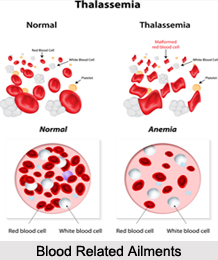 Human blood is the living tissue made up of liquid and solids. The liquid part, called "Plasma" is made of water, salts and protein. The solid part of the blood contains Red Blood Cells, White Blood Cells and Platelets.
Human blood is the living tissue made up of liquid and solids. The liquid part, called "Plasma" is made of water, salts and protein. The solid part of the blood contains Red Blood Cells, White Blood Cells and Platelets.
Blood related ailments affect one or more parts of the blood and prevent the blood from doing its job. Many blood diseases are caused by genes, other diseases, side effects of medicines and a lack of certain nutrients in a diet. There are many different blood diseases that are diagnosed and treated by haematologists. Treatments and prognosis for blood diseases vary, depending on the blood condition and its severity. Some of them are as follows:
•Anaemia: People with anaemia have a low number of red blood cells.Anaemia can cause fatigue, pale skin and shortness of breath with exertion. It is one of the most common blood related diseases.
•Thalassaemia: This is a genetic form of anaemia that is mostly caused by a defect in a gene. Thalassaemia is a disorder that prevents a person from producing enough healthy haemoglobin to carry oxygen around the body. People may need regular blood transfusions to relieve anaemia symptoms.
•Lymphoma: A form of blood cancer that develops in the lymph system. In lymphoma, a white blood cell becomes malignant, multiplying and spreading abnormally. It is the 5th most common type of cancer.
•Leukaemia: A common form of blood cancer in which a white blood cell becomes malignant and multiplies inside bone marrow. Leukaemia may be acute or chronic. Chemotherapy or stem cell transplantation can be used to treat leukaemia and may result in a cure.
•Multiple Myeloma: A blood cancer in which a white blood cell called a plasma cell becomes malignant. The plasma cells multiply and release damaging substances that eventually cause organ damage. Multiple Myeloma has no cure, but stem cell transplant and/or chemotherapy can allow many people to live for years with the condition.
•Sepsis: An infection somewhere in the body spreads into the blood. Symptoms include fever, rapid breathing, respiratory failure and ow blood pressure. It is a life-threatening illness caused by the body"s response to an infection.
•Haemophilia: A genetic deficiency of certain proteins that help blood to clot. There are multiple forms of haemophilia, ranging in severity from mild to life-threatening.




